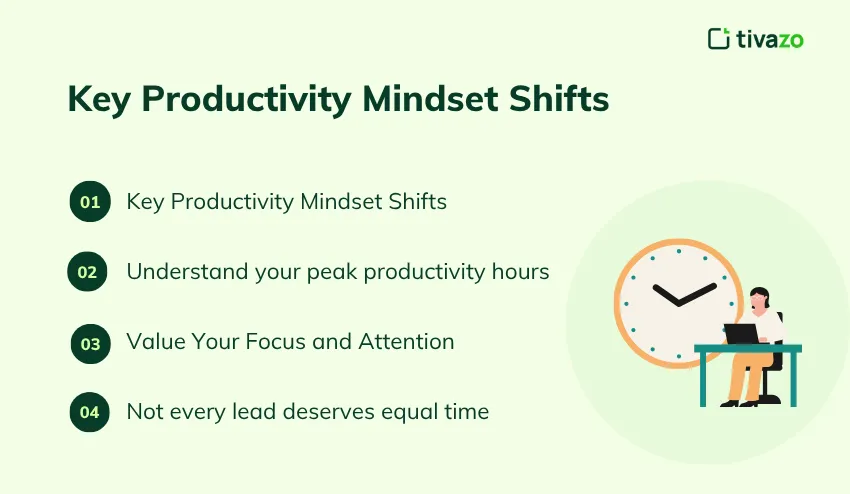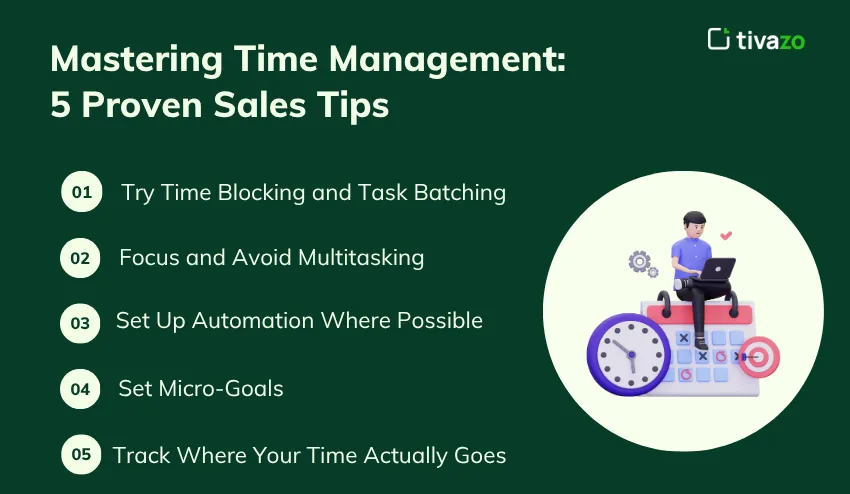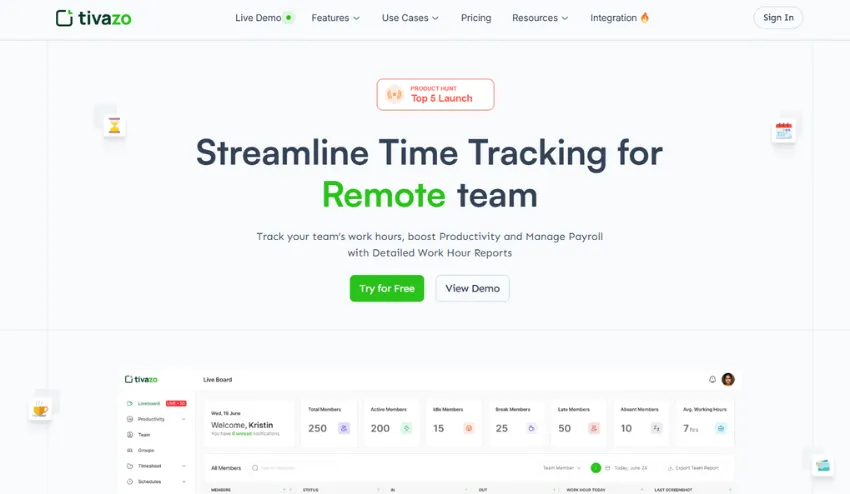For many, sales success depends on the quality of scripts and objection-handling guides. While this is true, there is another essential element that’s often overlooked. It’s how your sales team uses their time. Are they truly efficient?
Mastering Time Management in sales might not be the most popular topic, yet it is something that can really improve salespeople’s KPIs. It’s not about short-term wins, but about learning a skill of doing more faster.
In this guide, we’ll cover some of the best tips and strategies that will help you make your sales more productive.
Is Sales Time Management Really Important?
Nothing can answer this question better than the hard data. So, here it is:
On average, sales reps spend only 28% of their week actually selling. The rest of their time (72%) goes to administrative and other tasks.
Isn’t this crazy? Now, imagine if you could somehow find just one extra hour a day for your team to do what they do best, sell. Your results could be phenomenal.
After all, we all understand that the effectiveness of your salespeople is a direct indicator of your sales volume. It seems so logical. Yet, many attribute their sales productivity to extensive training or new tools.
Sure, these are fantastic. But what matters even more is what your team is doing every single day. And according to the stat above, we all have some room for improvement. What should you change, though? The very first thing is the mindset.
Key Productivity Mindset Shifts
If you want to be more efficient and work faster without stress or burnout, you first need to change how you think about your job.

Understand your peak productivity hours
We aren’t superhumans. We all have our peak and low-energy parts of the day. And it’s okay. What’s not okay is trying to squeeze in calls and outreach when your focus dips while prioritizing administrative tasks during the most active phases.
So, your time management for sales should be based on your attention levels throughout the day. This is exactly what you can do:
- Find out when you’re most productive (for many, it’s before lunch).
- Create a clear plan for those couple of hours when you focus on your most important tasks (probably calls and outreach).
- If you’ve got meetings during that time that aren’t really critical for you (we all have those), talk to your team lead about skipping them. Your company wants you to do your job well, so they’ll probably understand.
Value Your Focus and Attention
This tip is slightly connected to the previous one. Your attention span is limited, so you want to guard it as much as you can. After you learn your peak work hours, reserve them for the important tasks only. This means:
- Avoid checking emails or Slack messages.
- Block this time in your calendar, especially if you have an open calendar system.
- Set up your phone and other devices to “do not disturb”.
Not every lead deserves equal time
Now this one is about priorities. Every experienced direct sales representative knows that each lead deserves a different level of attention. While it might sound harsh, in reality, spending the same amount of time on clients who bring in $1,000 and those who generate $10,000 just doesn’t make much sense.
So, some of the best things you could do are:
- Always assign the level of priority for each prospect if you don’t already.
- Track how much time you spend on each potential client.
- Remember about the 80/20 rule (20% of clients often generate 80% of revenue). And you should spend most of your time on those 20% of customers
Mastering Time Management: 5 Proven Sales Tips
We can talk about the mindset all we want, but you also need clear strategies that can make it work for you. And here they are.

1. Try Time Blocking and Task Batching
Time blocking is one of the best deep work techniques. Why? Because you aren’t trying to do everything at once. When your brain focuses on one particular task, you end up finishing it more quickly and accurately. But when you switch all the time, you increase your mental load and end up being all over the place.
So, ideally, you want to:
- Schedule your every single day to be prepared and know what you need to do.
- Do similar activities together, and never batch unrelated things.
- Block particular time slots for everything and avoid any distractions.
2. Focus and Avoid Multitasking
Even with time blocking, it’s tempting to try doing everything at once. For example, while working on a particular client, you might start drafting emails, then switch to a presentation, and later look for relevant examples to share with them.
But even though it’s all related to one customer, trying to do three absolutely different things at once isn’t really effective. You’ll likely end up finishing none.
So, next time when you face a similar situation, remember that multitasking is a productivity killer. It’s just a sure way to feel overwhelmed, which will hardly make you more efficient.
3. Set Up Automation Where Possible
To actually master sales time management, you’ll definitely need automation where possible. Probably you have already automated something. But your goal is to always look for repetitive tasks and try to find a solution that can help you optimize the process.
Look at your everyday work routine as a system:
- What are you doing manually that can be automated (at least partially)?
- Are there some repetitive things that you might need a template or AI workflow for?
- Is there something you keep doing over and over again because your files aren’t organized enough?
Automation isn’t only about some tools. Sometimes, it’s about order. Even organizing your documents properly can help you find everything faster.
4. Set Micro-Goals
Your KPIs might sometimes feel overwhelming and huge. So, it’s always easier for our brains to deal with smaller tasks.
For example, let’s say you know that in order to close a deal, you typically need to contact 10 leads. And let’s assume that your objective is to close 10 deals every month. Now, do the math. It means you should ideally reach out to about 5 new prospects each day and follow up with another 5 (as an example).
Whatever your target is, try to set up manageable micro-goals to know exactly what to do every day.
5. Track Where Your Time Actually Goes
Sometimes, what it feels like isn’t how it really is. We often assume we’ve spent an hour on a particular task, only to realize it actually took three. That’s why time tracking is absolutely essential.
Try tracking your activities for just one week: it should give you a pretty accurate picture. During this time, pay attention to the following:
- How much time you spend on each task.
- What disrupts your workflow most.
- Where you lose time.
Then, after the week ends, analyze what can be improved. If you’ve never done anything similar before, you’ll be surprised.
Effective Time Management Tools for Sales Professionals
Now that we’ve discussed the mindset shifts and the actual tips to help you optimize your time, let’s also cover some tools that can be useful.
CRM Optimization and Automation
This one is rather obvious, and most sales teams already have it in place. So, basically, the idea is simple: use HubSpot, Salesforce, or any other AI-nativeCRM to automate processes like:
- Lead scoring,
- Task reminders,
- Follow-up triggers, etc.
Meeting Scheduling Tools
If you’re still simply using emails to schedule your meetings, it isn’t the most productive way to do that.
It might seem like it doesn’t take that much time. But in reality, it’s a lot of back-and-forth to find a time slot that works for everyone. So, use something like Calendly to let your prospects book calls automatically in literally one click.
Email Sequences
If you are using emails to outreach to your leads (and you likely are), automate what you can. This can include:
- Scheduling follow-ups.
- Sending automated post-meeting summaries.
- Creating templates for the most common use cases.
To help you with this, you can use your CRM or an outreach-specific tool.
Sales Enablement Tools
And last but not least, make sure you have some sales enablement processes in place. You can start by simply organizing your Google Drive properly. But if you want to take it to the next level, platforms like Seismic or Highspot can help you store and manage your documentation.
If you don’t have anything similar yet, this will be a true lifesaver during the pitch stage.
Time Management and Team Tracking
If you have a remote team, it’s pretty hard to integrate all these new time management tips for sales. But there are tools that can make it really simple.

With Tivazo, you can have a clear idea of who’s doing what and how much time everyone spends on tasks that could be automated or dropped altogether.
Conclusion
Time management for sales professionals might not be the first thing that comes to mind when you want to grow your sales. But after reading this guide, you understand that it’s more important than it seems.

So, one of the best things any team could do is schedule regular assessments of where your salespeople’s time goes. If most of it is wasted on some management and organizational process, you have to think about how you can help your people do their jobs better.




